Here is a really great report from the BBC . It is about my main interest and what I feel really strong about, PLASTIC. When you have read it, see if you reach the same conclusion as I did! There have been so many of these initiatives before!
There is one man-made material that you can find in the earth, the air and in the deepest ocean trenches. It is so durable that the majority of what has been created is still present in our ecosystem. Having made its way into the food chain, it permeates our bodies, flowing from our blood into our organs, even finding its way into the human placenta.
It is of course plastic, and this durability is also what makes the material so useful. Cables stretching across ocean floors, water pipes under the ground and packaging that keeps food fresh all rely on this property.
Efficiently recycling plastic by conventional means is notoriously difficult, and only 9% of all plastic ever made has been recycled into new plastics. But what if there was a way to turn plastic back into the stuff it was made from? The "next grand challenge" for polymer chemistry – the field responsible for the creation of plastics – is learning to undo the process by turning plastics back into oil.
Instead of a system where some plastics are rejected because they are the wrong colour or made of composites, chemical recycling could see all types of plastic fed into an "infinite" recycling system
This process – known as chemical recycling – has been explored as a viable alternative to conventional recycling for decades. So far, the stumbling block has been the large amount of energy it requires. This, combined with the volatile price of crude oil sometimes makes it cheaper to produce new plastic products than to recycle existing plastic.
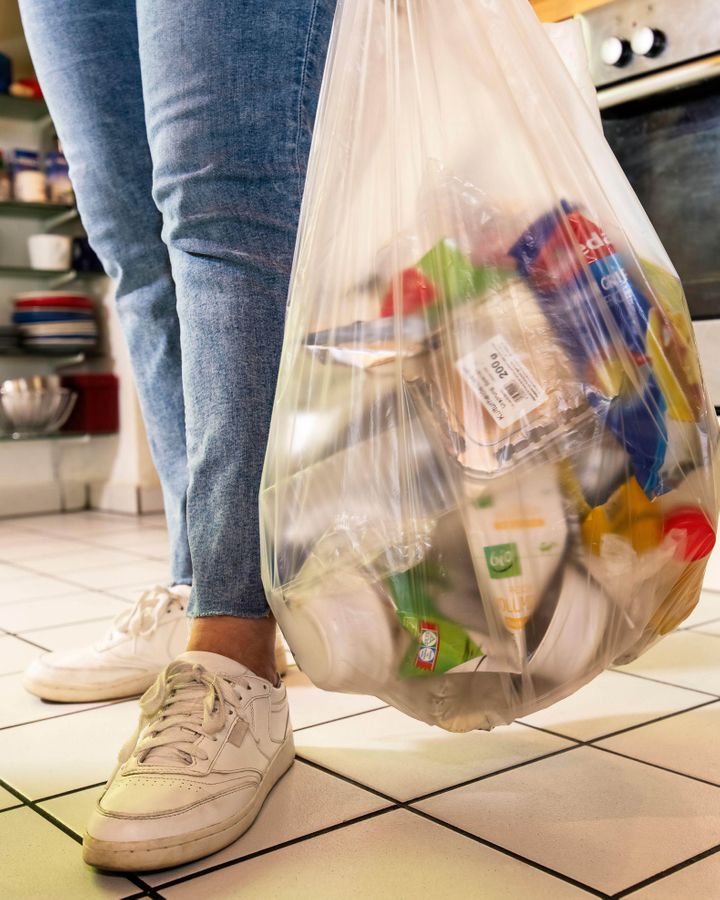
plastics that could be recycled end up in landfill because of poor facilities, or confusion about what is and isn't recyclable (Credit: Alamy)
Every year, more than 380 million tonnes of plastic is produced worldwide. That's about the same as 2,700,000 blue whales – more than 100 times the weight of the entire blue whale population. Just 16% of plastic waste is recycled to make new plastics, while 40% is sent to landfill, 25% to incineration and 19% is dumped.
Much of the plastic that could be recycled – such as polyethylene terephthalate (PET), which is used for bottles and other packaging – ends up in landfill. This is often due to confusion about kerbside recycling or contamination with food or other types of waste.
Other plastics – such as salad bags and other food containers – find their way to landfill because they are made up of a combination of different plastics that can't be easily split apart in a recycling plant. Litter dropped in the street and lightweight plastics left in landfill sites or illegally dumped can be carried by the wind or washed into rivers by the rain, ending up in the ocean.
Chemical recycling is an attempt to recycle the unrecyclable. Instead of a system where some plastics are rejected because they are the wrong colour or made of composites, chemical recycling could see all types of plastic fed into an "infinite" recycling system that unmake plastics back into oil, so they can then be used to make plastic again.
The way plastic is currently recycled is more of a downward spiral than an infinite loop. Plastics are usually recycled mechanically: they are sorted, cleaned, shredded, melted and remoulded. Each time plastic is recycled this way, its quality is degraded. When the plastic is melted, the polymer chains are partially broken down, decreasing its tensile strength and viscosity, making it harder to process. The new, lower grade plastic often becomes unsuitable for use in food packaging and most plastic can be recycled a very limited number of times before it is so degraded it becomes unusable.
The emerging industry of chemical recycling aims to avoid this problem by breaking plastic down into its chemical building blocks, which can then be used for fuels or to reincarnate new plastics.
In the UK, Mura Technology has begun construction of the world's first commercial-scale plant able to recycle all kinds of plastic
The most versatile version of chemical recycling is "feedstock recycling". Also known as thermal conversion, feedstock recycling is any process that breaks polymers down into simpler molecules using heat.
The process is fairly simple – take a plastic drinks bottle. You put it out with your recycling for collection. It is taken, along with all the other waste, to a sorting facility. There, the rubbish is sorted, either mechanically or by hand, into different kinds of materials and different kinds of plastics.
Your bottle is washed, shredded and packed into a bale ready for transportation to the recycling centre – so far, the same as the conventional process. Then comes the chemical recycling: the plastic that formerly made up your bottle could be taken to a pyrolysis centre where it is melted down. Next it is fed into the pyrolysis reactor where it is heated to extreme temperatures. This process turns the plastic into a gas which is then cooled to condense into an oil-like liquid, and finally distilled into fractions that can be put to different purposes.
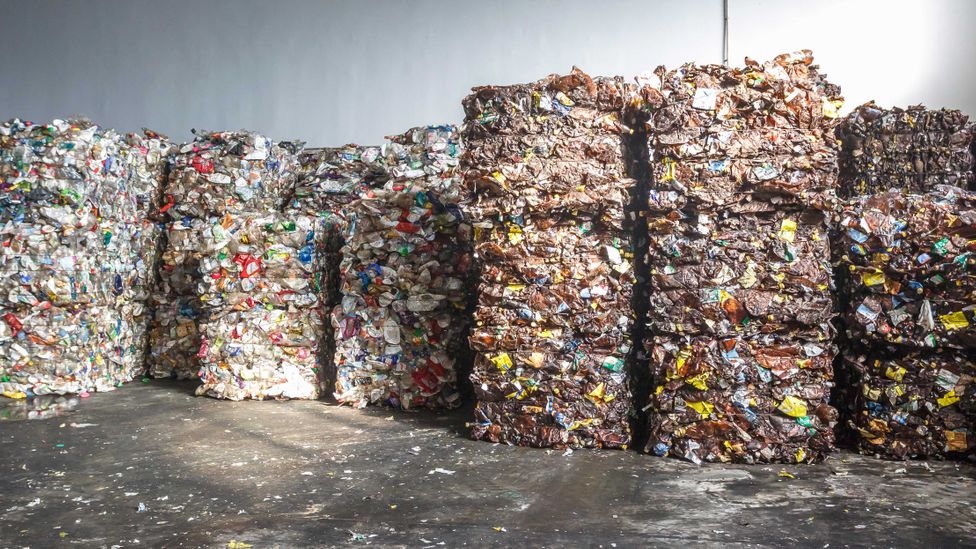
Chemical recycling begins the same way as ordinary mechanical recycling, with collecting and crushing plastics and taking them to a plant (Credit: Alamy)
Chemical recycling techniques are being trialled across the world. UK-based Recycling Technologies has developed a pyrolysis machine that turns hard-to-recycle plastic such as films, bags and laminated plastics into Plaxx. This liquid hydrocarbon feedstock can be used to make new virgin quality plastic. The first commercial-scale unit was installed in Perth in Scotland in 2020.
The firm Plastic Energy has two commercial-scale pyrolysis plants in Spain and plans to expand into France, the Netherlands and the UK. These plants transform hard-to-recycle plastic waste, such as confectionery wrappers, dry pet food pouches and breakfast cereal bags into substances called "tacoil". This feedstock can be used to make food-grade plastics.
In the US, the chemical company Ineos has become the first to use a technique called depolymerisation on a commercial scale to produce recycled polyethylene, which goes into carrier bags and shrink film. Ineos also has plans to build several new pyrolysis recycling plants.
In the UK, Mura Technology has begun construction of the world's first commercial-scale plant able to recycle all kinds of plastic. The plant can handle mixed plastic, coloured plastic, plastic of all composites, all stages of decay, even plastic contaminated with food or other kinds of waste.
Mura's "hydrothermal" technique is a type of feedstock recycling using water inside the reactor chamber to spread heat evenly throughout. Heated to extreme temperatures but pressurised to prevent evaporation, water becomes "supercritical" – not a solid, liquid, nor gas. It is this use of supercritical water, avoiding the need to heat the chambers from the outside, that Mura says makes the technique inherently scalable.
"If you heat the reactor from the outside, keeping an even temperature distribution is really hard. The bigger you go the harder it gets. It's a bit like cooking," explained Mura's chief executive, Steve Mahon. "It's hard to fry a big steak all the way through but if you boil it, it's easy to make sure it's cooked evenly all the way through."
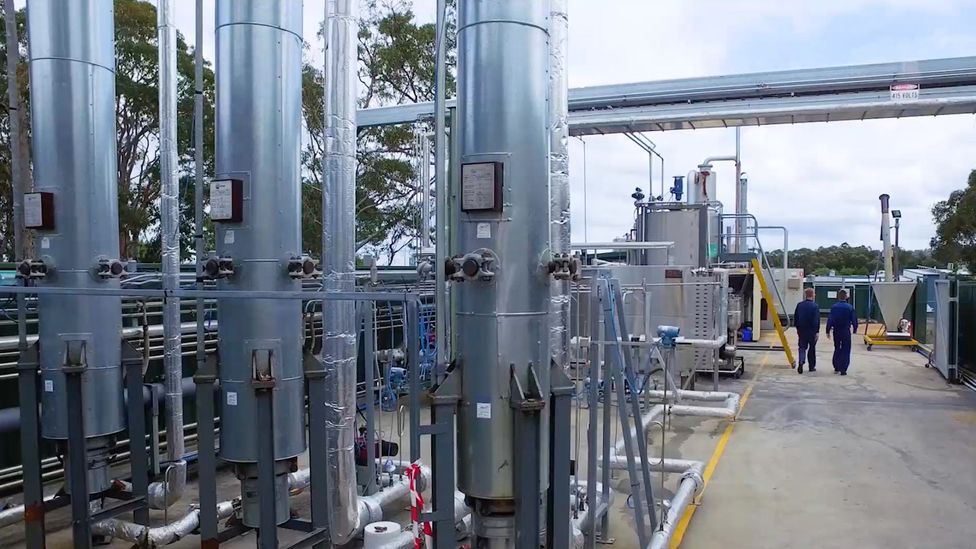
A pilot plant has shown that the use of very hot, supercritical water can help chemical recycling scale-up to useful levels (Credit: Licella)
The plastic waste arrives on site in bales – contaminated, multi-layer plastic such as flexible films and rigid trays that would otherwise have gone to incineration or energy-from-waste plants. The bales are fed into the front-end sorting facility to remove any inorganic contaminants such as glass, metal or grit. Organic contaminants such as food residue or soil are able to pass through the process. The plastic is then shredded and cleaned, before being mixed with supercritical water.
Once this high-pressure system is depressurised and the waste exits the reactors, the majority of liquid flashes off as vapour. This vapour is cooled in a distillation column and the condensed liquids are separated on a boiling range to produce four hydrocarbon liquids and oils: naphtha, distillate gas oil, heavy gas oil and heavy wax residue, akin to bitumen. These products are then shipped to the petrochemical industry.
As with other feedstock techniques, there is no down-cycling as the polymer bonds can be formed anew, meaning the plastics can be infinitely recycled. With a conversion rate of more than 99%, nearly all the plastic turns into a useful product.
Mahon said: "The hydrocarbon element of the feedstock will be converted into new, stable hydrocarbon products for use in the manufacture of new plastics and other chemicals." Even the "fillers" used in some plastics – such as chalk, colourants and plasticisers – aren't a problem. "These drop into our heaviest hydrocarbon product, heavy wax residue, which is a bitumen-type binder for use in the construction industry."
The hot, excess gases generated during the process will be used to heat the water, increasing its energy efficiency, and the plant will be powered by 40% renewable energy. "We want to use as much renewable energy as possible and will be seeking, wherever practical, to aim for 100%," says Mahon.
Mura's Teesside plant, due for completion in 2022, aims to process 80,000 tonnes of previously unrecyclable plastic waste every year, as a blueprint for a global rollout, with sites planned in Germany and the US. By 2025, the company plans to provide one million tonnes of recycling capacity in operation or development globally.
"[Our] recycling of waste plastic into virgin-equivalent feedstocks provides the ingredients to create 100% recycled plastics with no limit to the number of times the same material can be recycled – decoupling plastic production from fossil resource and entering plastic into a circular economy," says Mahon.
Scientists such as Sharon George, senior lecturer in environmental science at Keele University, have welcomed Mura's development. "This overcomes the quality challenge by 'unmaking' the plastic polymer to give us the raw chemical building blocks to start again," says George. "This is true circular recycling."
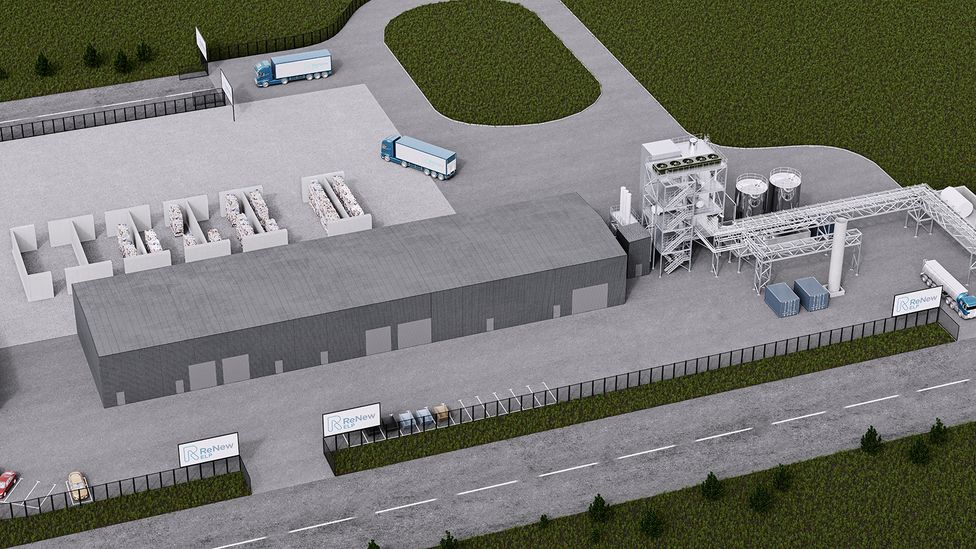
The plant that is being constructed at Teesside in the UK aims to process 80,000 tonnes of plastic waste every year (Credit: Mura)
Yet in the past 30 years, chemical recycling has shown serious limits. It is energy-intensive, has faced technical challenges and proved difficult to scale up to industrial levels.
In 2020, a report by the Global Alliance for Incinerator Alternatives (Gaia), a group of organisations and individuals who promote social movements to reduce waste and pollution, concluded that chemical recycling is polluting, energy intensive and prone to technical failures. The report concluded that chemical recycling was not a viable solution to the plastic problem, especially at the pace and scale needed.
Additionally, if the end product of chemical recycling is an oil used for fuel then the process does not reduce the need for virgin plastic, and burning such fuels would release greenhouse gases just as ordinary fossil fuels do.
"Environmental NGOs are keeping a close eye on emerging recycling methods," says Paula Chin, sustainable materials specialist at the conservation organisation WWF. "These technologies are in their infancy and they are by no means the silver bullet solution to the plastic waste problem. We should focus on increasing resource efficiency as a way to minimise waste through greater reuse, refill and repair systems – not relying on recycling to be the saviour."
But Mura argues that their plant will fill a much-needed niche. "[Chemical] recycling is a new sector, but the scale at which it is developing, specifically for Mura, shows both the urgent need for new technology to tackle the rising problem of plastic waste and environmental leakage, and an opportunity to recycle a valuable ready-resource, which is currently going to waste," Mahon says.
Mura's process aims to complement existing mechanical processes and infrastructure, not compete with them, recycling materials that would otherwise go to landfill, incineration or into the environment. All the waste plastic they process will be made new plastics or other materials, none will be burnt for fuel.
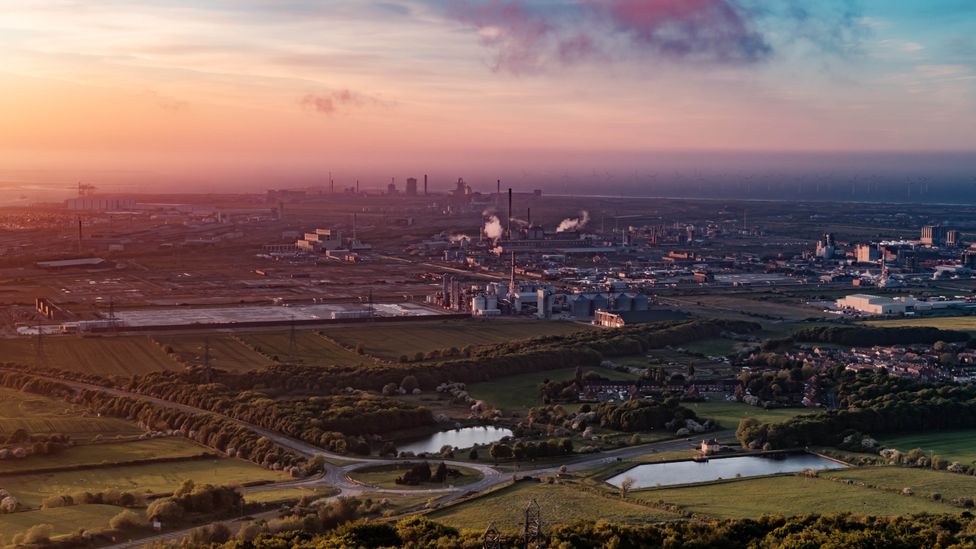
Many chemical recycling plants in the past have gone bust, but Mura believes the supercritical water technique it uses will make it economically viable (Credit: Mura)
Mura hopes its use of supercritical water for efficient heat transfer will allow them to scale-up to industrial levels, lowering energy use and costs. It could be a crucial factor for success where others have failed.
One of the main reasons chemical recycling has failed to take off so far has been financial collapse. In a 2017 report, Gaia noted multiple projects that had failed, including the Thermoselect facility in Germany which lost more than $500m (£350m) over five years, the UK's Interserve which lost £70m ($100m) on various chemical recycling projects, and many other companies that faced bankruptcy.
Financial difficulty is something that has held back not just chemical recycling but all kinds of plastic recycling. "The economics do not stack up. Collecting, sorting and recycling packaging is simply more expensive than producing virgin packaging," says Sara Wingstrand, New Plastics Economy Project Manager at the Ellen MacArthur Foundation.
Wingstrand says the only path to "dedicated, ongoing and sufficient funding at scale" for recycling is through mandatory, fee-based Extended Producer Responsibility schemes. These would see all industries that introduce plastic contributing funding to collect and process their packaging after its use. "Without them, it is very unlikely recycling of packaging will ever scale to the extent required," says Wingstrand.
But Mahon believes a system like Mura's is another way to shift the balance sheets in favour of plastic recycling by producing an oil that can be sold at a profit. Mura has recently announced partnerships with the plastic manufacturers Dow and Igus GmbH, and the construction firm KBR.
"The interesting thing here is that Mura can find value in plastics that aren't usually economically viable to recycle mechanically," says Taylor Uekert, researcher at the Cambridge Creative Circular Plastics Centre, University of Cambridge.
Even with the ability to unmake all types of plastic so they can be reused again, it is unlikely to make all of the problems with plastic pollution go away. With so much ending up in landfill and the environment, plastic will continue doing what it was made to do – endure.
The emissions from travel it took to report this story were 0kg CO2. The digital emissions from this story are an estimated 1.2g to 3.6g CO2 per page view. Find out more about how we calculated this figure here.
I can´t help but wonder if this is just another one of those gimmicks that will gain certain companies a great deal of money, the government some breathing space and in the end not work.
Why aren´t governments encouraging less use of plastics by giving incentives to those companies trying to do zero waste? Those shops where you take along your empty containers (preferably not plastic) and refill them. This is the way forward.
I know that a lot of people are saying that the responsibility for reducing plastic waste shouldn´t rest completely on the shoulders of the consumers, but at the end of the day aren´t we all consumers? The companies who make the plastic have employees who buy plastic, the owners buy plastic, the town where the factories are situated is full of people who buy plastic. WE ARE ALL RESPONSIBLE and the more time everyone tries to keep passing the blame on to others the more time the only world we have is turning to SHIT.
Reduce the amount of plastic you put in your shopping basket/trolley each day/week, it is really very easy, pick the glass container instead of the plastic one, choose a canned container instead of a plastic one, the difference in price is not that great.
It is really quite bizarre that we all have more free time than ever before but never have any time to cook at home, care for others, recycle or keep our streets and beaches free of litter! Preferring instead to eat take-aways and sit glued to mobile phones, believing everything that is put on the internet. The older generations have been criticised for not questioning the newspapers and tv news but isn´t this just the same?
The blog song for today is:"People are strange" by the Doors
TTFN
--



No comments:
Post a Comment